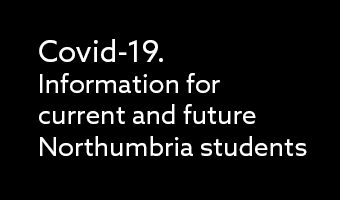- Home
-
Study
Study
Interested in studying at Northumbria? With 31,500 students, Northumbria is one of the largest universities in the country, offering courses on either a full-time, part-time or distance learning basis.
Discover more-
Undergraduate
- Undergraduate Study
- Undergraduate Events
- Application Guides
- Exhibitions
- Foundation Years
- Undergraduate Fees & Funding
- School & College Outreach
-
Postgraduate
- Postgraduate Study
- Postgraduate Research Degrees
- Postgraduate Open Days and Events
- Postgraduate Fees & Funding
- Flexible Learning
- Thinking about a Masters?
- Continuing Professional Development
- Change Direction
-
Student Life
- The Hub - Student Blog
- Accommodation
- Life in Newcastle
- Support for Students
- Careers
- Information for Parents
- Students' Union
- Northumbria Sport
-
-
International
International
Students from all over the world choose Northumbria University for many reasons; our academic excellence, and that they will benefit from a fantastic student experience.
Discover more-
Applying to Northumbria
- European Union
- Our London Campus
- Northumbria in Amsterdam
- Northumbria Pathway
- Our Regional Offices
- Where are we visiting
- Northumbria and your Country
- Entry Requirements
-
Northumbria Language Centre
- Faculty Requirements
- Acceptable English Requirements
- Pre-Sessional English and Study Skills
- Academic Language Skills Programmes (ALS)
-
International & EU Fees, Funding & Scholarships
- EU/International Undergraduate Fees
- EU/International Undergraduate Funding
- International Masters Fees
- International Masters Funding
- International Postgraduate Research Fees
- International Postgraduate Research Funding
- International Money Matters
-
Life at Northumbria
- Accommodation
- International student support
- The Hub - Student Blog
- Careers
-
Study Abroad Erasmus and Exchange
- Study Abroad, Exchange and Erasmus
- Incoming Students
- Europe (Erasmus +) - including staff mobility
-
-
Business
Business
The world is changing faster than ever before. The future is there to be won by organisations who find ways to turn todays possibilities into tomorrows competitive edge. In a connected world, collaboration can be the key to success.
Discover more -
Research
Research
Northumbria is a research-rich, business-focused, professional university with a global reputation for academic quality. We conduct ground-breaking research that is responsive to the science & technology, health & well being, economic and social and arts & cultural needs for the communities
Discover more -
About Us
About Us
Northumbria University is based in the heart of Newcastle upon Tyne, which is regularly voted the best place in the UK for students who are attracted by our excellent academic reputation, our top 10 graduate employment record and our outstanding campus and sports facilities.
Discover more-
About Northumbria
- Our Vision
- Our Staff
- Our Partners
- Student Profiles
- Alumni Profiles
- Leadership & Governance
- Academic Departments
- University Services
- History of Northumbria
- Contact us
- Online Shop
-
-
Alumni
Alumni
Northumbria University Alumni Association ensures our graduates stay in touch with news from the University and fellow alumni. With membership of over 217,000 graduates in 171 countries worldwide; it doesn’t matter where you are located or what you are doing, YOU are our global alumni family. It's free to join for graduates of Northumbria University and our constituent colleges.
Discover more - Work For Us
In this module you will learn about a comprehensive range of research methods and business analytics techniques. This will equip you with the knowledge and practical skills necessary for you to conduct research at Masters’ level and prepare you to complete a Master’s Dissertation, Consultancy Project or Management Enquiry. By the end of the module you will know how to apply both quantitative and qualitative data collection and business analysis techniques. In quantitative techniques you will learn about sampling, questionnaire design, statistical inference, and hypothesis testing while qualitative techniques covered will include methods such as interviewing and focus groups. Analysis methods such as content analysis and thematic analysis will also be covered. In addition, you will gain some understanding of research philosophy (positivism and interpretivism) and research ethics and you will be able to write a research proposal to bring these ideas together.
Furthermore, this module will provide clear, critical, and analysis of data, you will also be able to consider the use of analytics implementation skills, where you will be introduced to analytics software such as SPSS. SPSS statistics analysis is one of the powerful solutions that is designed to help businesses and researchers to solve problems by various methods (geospatial analysis, predictive analytics and hypothesis testing).
















